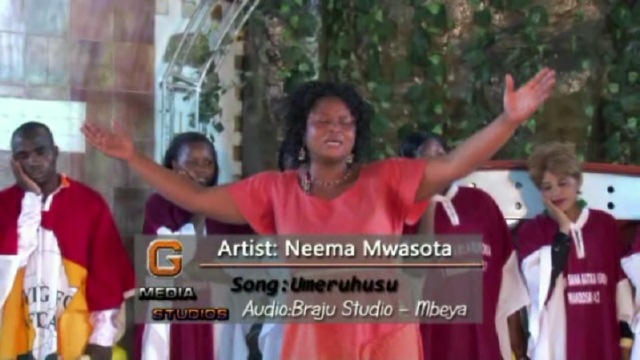
Tanzanian Gospel Music Singer Upendo Nkone (L) Sings at Na tional Stadium at Easter festival in 2013 as packed Stadium listens (Photo: Tanzania Gospel Music Blogspot.com)
By TZ Business News Staff.
It is correct to say many Tanzanians love Gospel music, although reasons for this love vary. For some, gospel music is a worship experience while for others it has developed into just another business. Muslims, on the other hand, are slowly getting into the religious music tradition.
The 2013 Easter holidays witnessed the country’s national stadium in Dar es Salaam filled to capacity, when some of Africa’s renown gospel music singers–including Sipho Makhabane of South Africa—performed. Others came from Kenya, Rwanda, Zambia and Zimbabwe. The foreign singers had come to join Tanzanian counterparts to celebrate Easter in the spiritual festival graced by the presence of the nation’s Prime Minister Mizengo Pinda.
An entrepreneur in Dar es Salaam, Shayo Felix, equates the overwhelming love for gospel music in Tanzania with changes of attitudes among Tanzanians. People are finding gospel music to be a good way to learn from other people’s experiences through music.
Many Tanzanians have developed love for gospel music as a new cultural orientation, Shayo said. The outcome has become that people use gospel music as their mobile phone caller tunes, while others just love melodies with the Christian message.
A Lecturer at the Department of Fine and Performing Arts of the University of Dar es Salaam, Dr. Abdullah Muhamed, holds the opinion there are two reasons for this love among those performing religious music. There are those who are in the industry for religious reasons, but there are also those who perform religious music for money which can be generated from sales.
Shayo concedes the economic motivation as a contributing factor to this cultural orientation. A lot of business people from upcountry visiting Dar es Salaam purchase more gospel music for resale than they do secular music, he said. Gospel music is therefore being chosen as a source of livelihood for some.
Another music professor at the University of Dar es Salaam who has done research on gospel music, Prof. Imani Sanga, agrees there are people who are in the industry for financial gain, but there are also those whose primary motive is the propagation of the Christian faith through music.
During his research, Sanga says he found people who criticized those motivated by financial gain but his personal opinion was that no motivation should be thought of as a bad motivation.
“I have done research on gospel music in Tanzania (muziki wa injili Tanzania), and I can assure you the motivations are many. Yes, there are financial motivations for some, but there are some who are really committed to putting their religion forward through music—and there are combinations [of motives],” Prof. Sanga said, with a conclusion which exonerates those motivated by financial gain from blame: “ Now my opinion is that every motivation is good for a particular musician,” he said.
But a Gospel music singer from Sumbawanga in south west Tanzania, Neema Mwasota, disagrees with Prof. Sanga. “If you mix business with gospel music singing, God can take away the spiritual gift of vision,” she said. “I was called to serve God. I don’t want to mix business with my gift of singing because then I might loose my gift.”

New Gospel Music Singer from Sumbawanga, Tanzania, Neema Mwasota (Photo: Screen Shot from Documentary Above)
Muslims, on the other hand, do not have the tradition of singing in mosques like their Christian counterparts do in the churches, but there are mosques in Ethiopia where music has become a part of the worship service according to Prof. Ezra Abate, an Ethiopian music professor who talked to TZ Business News. Here in Tanzania, observation reveals a movement toward muslim religious music growth in the form of Qaswida.
But motivations for Muslim music do not differ from motivations among their Christian counter parts.



